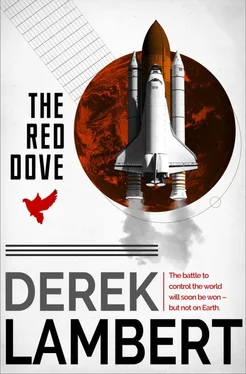Reynolds nodded. ‘Or the processor at Fort Knox for that matter. Or the FBI or CIA headquarters. Or the Pentagon.’
‘Because now we’ve given the Russians the idea…’ Vogel sat down in front of the green-glowing screen. ‘I asked the computer this morning if what the Soviets are about to try could ever succeed.’
‘And?’
‘It said it was possible.’
‘I entirely agree,’ Reynolds said, sitting down beside Vogel.
Vogel felt tension building up inside him. His heart seemed to flutter. He decided that, as soon as Reynolds had left, he would take his blood pressure.
In a modern block, situated in the north-east suburbs of Moscow on the route to Kaliningrad, Vogel’s innocent partner in deception crouched over a computer terminal. He, too, was consumed with worry.
Like Vogel, his worry also had a physical manifestation: it made him hungry. As he was frequently worried Sergei Yashin, who was thirty-two, was almost always famished, but as skinny as many a French chef.
At that moment, with five minutes left before the California Connection, he could have put away a saucepanful of borscht thick with cream, followed by Chicken Kiev washed down with a litre of tea.
Yashin’s worry had been seeded early in his career when he had discovered that Russia’s domestic computers were at least eight years out of date. In America they had already perfected memories with a million switching units etched on a micro chip: in the Soviet Union they couldn’t manage more than 100,000.
Why? Because the whole Soviet effort was channelled towards military might, that was why. Without any thought for the benefits that computers could bring to society. Benefits that would give people time to enjoy their world. That sort of thing.
Yashin’s exceptional appetite took a gluttonous turn on his twenty-fifth birthday. Standing in Red Square on 7 November watching the elephantine missiles trundle across the cobblestones, he suddenly thought: Most people in this city are lucky if they’ve got a car.
He worried and he ate and he got thinner.
Within the past few days his anxiety had been complicated by guilt. By taking part in this plot to rob the American computers of their space secrets, he was furthering Russia’s militarism. At the expense of the micro chips of peace.
In fact the only difference between the immediate worries of Daniel Vogel and Sergei Yashin was that, whereas Vogel feared that one day the Russians might truly penetrate Vandenberg, Yashin feared that day was today.
As he crouched, fingers touching the keyboard of the out-of-date terminal, poised to make contact with an extremely up-to-date system, Yashin was a very confused young man.
And his confusion wasn’t helped by the presence in the KGB communications HQ of Nicolay Vlasov, Chairman of the KGB, and Yuri Peslyak, head of its Second Chief Directorate. Vlasov had always seemed as remote as the President of the USSR to Yashin; Peslyak a little less so because Department 8 which employed Yashin was part of his Directorate.
The American named Massey who seemed to be the key to the whole thing, said in passable Russian: ‘Three minutes. Are you ready?’
‘Ready,’ Yashin said, rubbing his finger-tips together like a cardsharp.
Peslyak brushed cigarette ash from his jacket. ‘You look worried,’ he said.
Worried? He was weighted to his seat with guilt and apprehension. ‘I’m fine, Comrade Director.’
Vlasov said to Massey: ‘I hope for your sake, Mr Massey, that this works,’ the tone soft, the words threatening.
‘Now!’ snapped Massey. He dictated Vogel’s terminal identification number, XR 58437219, to Yashin. Yashin’s thin fingers danced across the keys.
A pause. Then the screen responded. Massey handed Yashin a scrap of paper bearing the figures 97639914. ‘Send that,’ he said and explained to the other two: ‘That’s the personal identification between Vogel and myself. It’s untraceable. It will also be different every time you want to make contact. A personal safety-guard,’ he said to Vlasov.
Another pause, longer this time.
‘I’ve also taken another precaution,’ Massey said pleasantly as they waited. ‘It only takes effect if you should one day decide that my presence is an embarrassment, i.e. the day you figure you’ve penetrated Vandenberg completely.’
‘We shall never consider you an embarrassment, Comrade Massey.’ Vlasov’s greenish eyes appraised Massey. ‘But, out of interest, what is this precaution?’
‘I’ve arranged to make contact with Vogel every six days. If he doesn’t hear from me for a period of longer than seven days then he blows the whole operation – without incriminating himself, of course. In fact he’ll come out smelling of roses.’
‘Interesting,’ Vlasov said, ‘but an academic exercise because we shall never cease penetrating Vandenberg. Why should we? American scientists will continue to make progress. We shall continue to keep up with it.’
Peslyak said: ‘What I don’t understand is how Vogel thinks he’s going to get away with it. What we’re perpetrating is grand larceny. American security must have contingency plans for such a theft.’
The pause continued. Yashin’s belly ached with hunger. He stared at the screen and saw a bowl of stew, smelled the spicy fragrance from its bubbles. His mouth watered and his stomach whined.
Massey said to Peslyak: ‘What you don’t understand is how vulnerable these highly sophisticated pieces of hardware are. And what you’re forgetting is that Vogel’s in charge. He is security. As soon as he’s given us the codes he’ll erase the entire communication from the computer’s memory.’
Figures appeared on the screen. The first sequence, Massey told them as they recorded them, was the terminal identification for the day for Vandenberg’s central processor; the second was the key code; the third the minimum access code.
‘Cut the connection,’ Massey ordered crisply.
Yashin looked inquiringly at Peslyak and Vlasov. Vlasov nodded. ‘Cut it. And now,’ he said, ‘we come to the interesting part.’ He handed Yashin a photostat of a report received by Soviet Military Intelligence (GRU) from which the source had been erased. ‘We know this about Columbia’s activities is true. So we’re going to ask the computers at Vandenberg about it. If they come up with the same information then your idea will begin to assume some credibility. I have to admit,’ he added, ‘that the information is far from new.’ He touched Yashin on the shoulder. ‘Start transmitting.’
Yashin tapped out the first number.
A moment’s hesitation. Then they were through.
The second number. Through again.
The third. And they had access.
Yashin immediately requested information on the project described in the GRU report. The reply came back in a snowstorm of letters and algebraic formulae. ‘FORTRAN,’ Yashin explained, glancing over his shoulder.
He disconnected the line, stood up and removed the print-out from the adjacent machine that had simultaneously translated the FORTRAN. He handed it with the original report to Vlasov.
Vlasov began to read aloud, pausing to compare the print-out with the GRU report: ‘Deposited by Columbia OV-103… deuterium fluoride… lasers of five megawatts directing 500 joules of energy…’
He folded print-out and report together and slipped them into the inside pocket of his jacket. He smiled thinly at Massey: ‘So far, so good. Vandenberg has confirmed what the GRU report said. That your compatriots are planning to use a shuttle to deposit a satellite in space armed with lasers. The object of those lasers, Mr Massey, is to destroy our satellites – and to think we signed an agreement with the United States to do no such thing. However,’ he shrugged, ‘we’re not here to discuss the politics of space. The point is that it would appear – and I put it no higher – that we have gained access to Vandenberg.’
Читать дальше
Конец ознакомительного отрывка
Купить книгу












